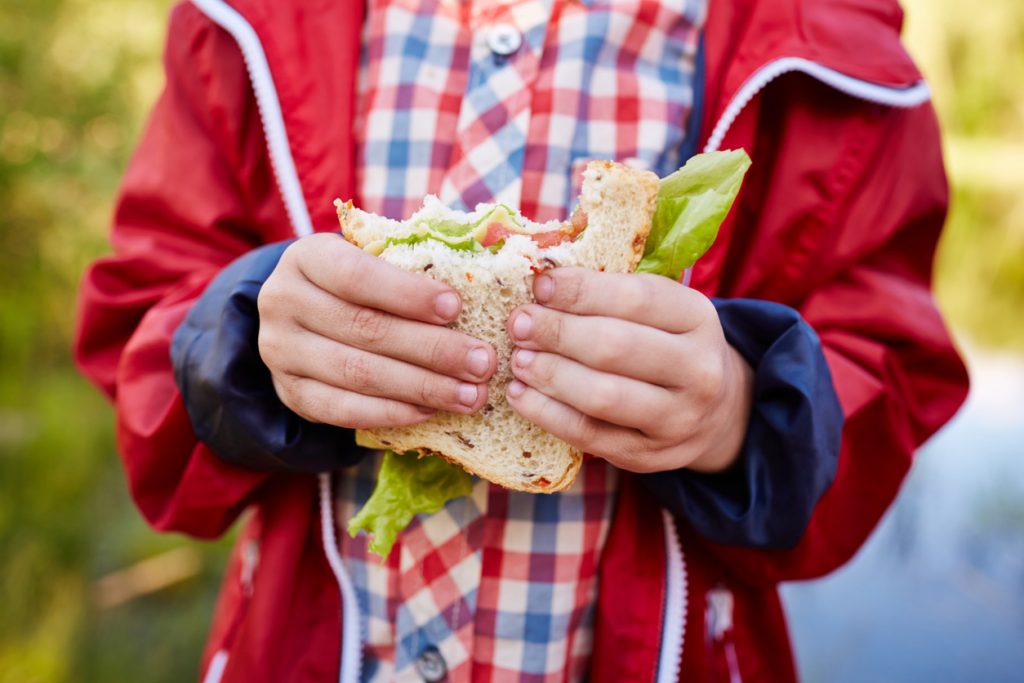Your Picky Eater Doesn’t Have the Same Rights as a Child with Food Allergies—And They Shouldn’t

When an Ontario mother initiated a petition at her daughter’s elementary school, I didn’t consider it an extraordinary instance. But the subsequent debate, on the other hand, blew my mind.
The petition wasn’t about Sex Ed, religion or even the “new math”. Nope, it was about peanut butter, and it was absolutely infuriating.
In November, Alyssa Holstock of Waterloo fought to reverse a ban on peanuts at her child’s elementary school—an unjust rule, she claims, because her young daughter is a picky eater. The ban prevents her from packing a lunch that her child will eat, resulting in a tired, hungry kid coming home at 3:00 pm. The solution? She should be able to send in nut products, which her picky child will happily consume. (She promises to label them, of course.)
Let’s take a minute to let that sink in.
A mother is fighting for the right to send peanut products to her kid’s school, knowing that those same products could be a death sentence for other children in the class. She feels entitled to do so not because her child requires a specific diet for medical reasons, but because her child is a picky eater.
In short, she’s willing to put children’s lives at risk in order to accommodate the preferences of her kindergartener.
I am outraged by the mere idea of this, and my kids don’t even have food allergies.
As parents, it’s our job to advocate for our children. As decent human beings, we should support each other in protecting and caring for the kids in our communities. We do this by slowing down when driving in school zones or, more generally, by not doing things that could kill children. Food allergies are not a choice—they’re a random, terrifying medical condition. Peanut allergies affect roughly 2 in every 100 kids here in Canada. Think about those numbers—if your child goes to a school with 1000 kids, roughly 20 of them have a peanut allergy. Many of these allergies could be severe or even life-threatening, and peanuts are a frequent culprit. Avoidance is critical to the safety of these children, and as responsible adults, we should support their well-being by packing allergen-free school lunches. This goes not only for the parents of kids with food allergies but for ALL individuals.
Life-threatening food allergies take precedence over food preferences, always.
Picky eating isn’t a condition your child has—it’s a behaviour.
And it’s a hell of a lot easier to deal with than anaphylactic shock.
So your kid “lives on” peanut butter sandwiches and won’t eat anything else? That’s challenging, but guess what? Peanut butter makes a great after-school snack in your home, where you’re free to do as you please. Get on Pinterest or Instagram and find some new lunch ideas. You’re going to need them, and eventually, your kid will adapt to nut-free lunches. In the meantime, feed them an amazing breakfast and have some great after-school snacks ready.
Trust me, they’ll survive in between.
I’ve heard plenty of arguments from the “pro-nuts” side, often centering around the idea that the world isn’t nut-free and therefore allergy-affected children should learn to adapt/manage their contact with nuts. After all, how will they survive “the real world” if they’re coddled in elementary school?
Well, let’s talk about small kids for a second because it appears that the people making this argument are unfamiliar with them.
In Ontario and other parts of Canada, kindergarten students can be as young as 3.5 years old at the start of the beginning of the school year. My own son was three when he started JK a few years ago, and I can tell you right now that his listening skills were far from perfect. No matter how smart, caring or well-behaved a child may be, there is no denying that the maturity of a three-year-old is limited. My son isn’t allergic to peanuts, but if he was, I couldn’t guarantee that he’d follow a protocol designed to avoid contact with them. If there were nuts in his school, he’d probably interact with them at some point. Maybe he’d be excited or distracted or just plain rebellious—any of those are possible—but I’m sure it would happen.
Or what if his friend was the one with the nut allergy?
Would my son be able to eat a peanut butter sandwich and then safely play with that classmate? Absolutely not, because small children are notoriously awful at washing their hands and faces. Even if they went to a sink and cleaned up with soap, there’d likely be residue (if not full-on clumps of peanut butter) on my kid’s face, hands or clothing. If you think your child is able to scrub themselves clean with surgical precision, I’m going to tell you—you’re wrong. I don’t care if your child is three, seven or eleven years old—their handwashing skills probably hover somewhere between adequate and abysmal.
We haven’t even touched on bullying through intentional exposure to allergens, which has been reported (for example, when a child taunts an allergy-affected child with something like a peanut butter sandwich). For a child that’s been trained to aggressively avoid contact with nuts, having a peanut in your face is no different than being threatened with a knife.
My kids’ school currently bans peanuts and tree nuts—not a legal requirement, but a common practice in many provinces. Some food allergies are less severe (i.e. not resulting in anaphylaxis) and those foods are not banned. For example, milk is allowed even though some kids have dairy allergies—but, if a child at the school was at risk of death from exposure to milk, that would be banned as well. All food restrictions disappear at the high school level when kids are expected to manage their allergies independently.
Having a picky eater is frustrating and inconvenient for parents.
But having a child with life-threatening food allergies is terrifying.
Can you imagine sending your child to school every day knowing that there was deadly anthrax somewhere in the building? Now imagine the anthrax is in their friends’ backpacks. Those kids are probably going to touch it at lunchtime but don’t worry—you’ve been assured that they’ll wash their hands before playing with your child.
Would that be enough to calm your fears?
Would your child be safe in this situation?
Yes, the ‘real world’ has nuts in it—but we don’t let four-year-olds cross a busy intersection alone because CHILDREN NEED HAND-HOLDING. The same thing goes for allergies—we make accommodations and take precautions now because kids rely on adults to keep them safe. As they age, we loosen the reigns and eventually let go.
Please remember that no child ever died from NOT having peanut butter.
If your child is coming home from school tired, grumpy and hungry because they can’t have a peanut butter sandwich for lunch, I feel for you – no one wants to see their kid struggle. But if your response to this issue is to endanger the lives of innocent children because it inconveniences your family? Let me remind you of this – your kid might be coming home hungry, but if you send nuts to school, another child might not come home at all.
That should be more than enough to convince us all.

















Thank you Erin for writing this article with great sensitivity and generosity of spirit to those children who live with life-threatening food allergies! I am a mom to a child who is deathly allergic to peanuts and tree nuts and, while most parents are sympathetic and bend over backwards to help keep my child safe, the complacency and entitlement of some (such as the petition mom you have written about) is mind blowing. Until your child’s vital signs are compromised and you have to take her to the hospital via ambulance; until you watch her heart break (over and over again) when her classmates or teammates or friends all get to enjoy a treat and she can’t join in the fun; until you try to plan a vacation, an outing with friends or a party…or, heck, just get through one day (because, in order to survive, we need to eat…therefore, every single morsel your child eats must be safe) you just don’t get how big a responsibility it is and how much work it is and how much worry is entwined in every interaction and social event. Thank you for writing this piece, the support and caring brought tears to my eyes. This woman needs to get a life and become a better parent. I would frankly be embarrassed to admit I had a child who would only eat one thing. Good luck to her!
@Chris, thank you so much for your kind words…I’m glad this made you feel supported. Regardless of any debate this post generates, know that there are a ton of people like me who want your kids to feel safe at school and believe they DESERVE to! All the best.
I just loved every part of this. I so appreciate EVERY word of this article. My son and daughter both suffer from life threatening food allergies and it really is just terrifying every time they are out of my care. Every phone call from the school, my heart literally stops. I have empathy for the parents with picky kids, but children can adapt. Kids with food allergies can’t just not react to stuff. It saddens me that people are still ignorant to this. It also warms my heart how many parents go above and beyond to keep my kids safe. Thanks again for writing this.
You have no idea how much this infuriates me!!! As a mother of a child with severe, life-threatening allergies to all nuts, shellfish and sunflower, I am so grateful to our schools for reducing the risk for him. Yes, I understand that he can’t be sheltered everywhere in life, but it’s nice to know he’s safe in the school environment at least. He is old enough to advocate for himself now which is great. I also love that all of the kids around him advocate for him as well. And kids, by nature, are kind and supportive. They want to keep their friends safe. What type of example are we setting for our kids to act in such a selfish way as this woman???
Thank you @Robin Forsyth and Karma for your comments! My heart goes out to you both for all the extra challenges, struggles and anxiety you must face.
I’m sorry but I disagree that a “picky eater” is a behavior and not a condition. It is not always a behavior. My child has a sensory processing disorder as a result of an organic brain injury, which makes it impossible for her to eat certain foods. That makes it a condition and not a behavior. We work around the peanut ban at our school. Please do not minimize the effect of being hungry and tired. These symptoms seriously affect our child’s ability to learn.
OUTRAGE!!!!
FEELS SO GOOD!!!!!
@Deanna I’m taking about picky eaters and that alone…not those who have eating issues due to medical conditions, i.e. sensory issues or autism. I still don’t think these kids should have nuts in their lunches, but the situation is different for sure – it’s a valid issue vs a behaviour. Sorry for the challenges you face! Thanks for reading and commenting.
You get it!!! Thank you!!
Side note: The poster “derma” DEFINITELY does not get it. Very inaccurate information with NO understanding of what food allergy life is like. 🙁
The thing is, though, peanut allergies are not airborne and there’s no evidence that systemic, respiratory, anaphylactic reactions happen with mere skin contact. https://www.sciencedirect.com/science/article/pii/S0091674903011205 Doubly blinded trials on kids with significant peanut allergies and have previously reported supposed reactions from smelling peanut butter show no reaction when the PB scent has been masked and they can’t tell whether they are breathing in PB or
or a fake. Those same kids also only showed rashes and such from touching PB, no respiratory issues or anaphylaxis.
I get that everybody wants to protect their children – that’s only natural – but peanut allergies are blown way out of proportion to their real risk. Latex allergies are almost as common as peanut allergies in kids (and more common in adults) but nobody talks about banning kiwifruits even though people have died from latex allergy anaphylactic shock due to ingestion or mucous membrane contact (eye rubbing, noose picking) with kiwifruits.
The response is inconsistent and overly draconian.
I think the issue is that it is an all school ban regardless if a child has an allergy in the class or not. I can understand accommodations when a child in the classroom has a severe allergy but why school wide. Also kindergarten compared to grade 4 and up are completely different situation, so again why the entire school. Nuts are a fantastic source of protein and are an easy and economical way to gets kids healthy snacks. A handful of almonds or walnuts is filled with so much that could keep a kid sustained for a while. Kids lunches are filled with so much crap these days because people look for the nut free symbol (as recommend by many schools) and those products are garbage, filled with sugar, dyes and other processed junk. Unhealthy eating or not eating leads to behaviour problems….especially young children who have issues controlling their own emotions as it is. Then who is responsible for the melt downs and other behaviour issues after kids come down from their sugar high and processed foods. The teachers don’t have enough resources and who suffers….the entire classroom. We should promote healthy and responsible eating habits for all the kids at a school.
Also lunches become so limited for parent so what do you send a kid, they don’t have microwaves to heat up stuff, they don’t have fridge access to keep things cold….and they only get like 10 minutes to eat….time yourself eating, see how much you eat in 10mins. Parents are so limited in being able to provide healthy, quick meals that their kids will eat, why ban something that is not even an issue in a classroom.
So, I teach at a high school where we have no bans. I am personally allergic to peanuts, and several of my colleagues are allergic to nuts generally. Cafeteria service is a terrifying dance, as the students often don’t know what’s in the food. Mostly I bring my own lunch, which is fine, but the level of ignorance from the students serving about what is in the food has put at least one kid in the hospital.
Students rely on our hot lunch program. I teach in a low income area, and for many, it’s the only food they’ll eat all day. But being allergy conscious would be “coddling” and “too hard”. I would live if they just knew what was in everything so I could make an informed choice. But no. So, enjoy epipen roulette!
Thank you, thank you, thank you. This brought tears to my eyes. If people showed just a fraction of the compassion you have, the world would be a better place. The number of times I’ve had to defend my child’s allergies, or the number of people that have suggested that it’s “not that serious” makes me sick to my stomach. I held my 7 month old baby in my arms while her lips turned blue and we waited for the ambulance. I wouldn’t wish that feeling on my worst enemy. If my daughter lived with another disability, no one in their right mind would question it, so why question a life threatening condition like food allergies. That woman is an awful human being and if her biggest challenge in life is her picky eater, i dream of being so #blessed. I dare her to try and walk a day in the shoes of a parent that fears their child making it home from school every day.
I am pretty sure that most kids that come home tired and hungry after not eating the lunch they were packed wont last long. After a few days of testing, they will feel horrible and hungry and eat whatever is in their bags. They are children! They don’t have developed brains! They just like something and want it all the time. It is up to parents to show them to try new things or deal with situations where there is someone else to think about. No one in the world HAS to eat peanut butter! Make a separate peanut butter eating room with hand and face sanitization stations, aprons and gloves.
98% of the population must be punished for 2% who have allergies? Nope. Teachers can utilize classroom management skills and use wipes. Children can be taught good habits.
Thank-you Erin! This is a wonderful peice and so grateful that non-food allergy moms like you are out there caring so much. It takes a community to keep my son, who in his class of just 20 is one of 2 kids w a nut allergy, safe from having a potentially deadly reaction. ❤️
Thank-you Erin! I am so grateful that there are non-food allergy moms like you who care about keeping other safe. It takes a community to keep kids like my son, who in his class of just 20 is one of 2 kids w a nut allergy, from having a potentially deadly reaction. ❤️
I appreciate this article for so many things as a food allergy parent who also had food allergies. Between my child and I, we have about a dozen food allergies (plus latex and environmental allergies). Tree nuts are on the list. But so is dairy. The author incorrectly states that other allergens cause less severe reactions than nuts. From personal experience, I’ve seen full blown anaphylaxis from exposure to milk. And eggs. And latex. And grass (the stuff on your lawn). Anything can cause anaphylaxis and no allergen is more important than another. Please edit your article to correct the factual mistakes in that small section. Implying that only nut allergies cause severe reactions is just unacceptable.
I appreciate the author’s empathy for those with nut food allergens, but echo Brandy’s concern below that the very end of the article inappropriately downplays the allergenicity of milk. I have a 5 year old with multiple allergies (including milk) and he has had his worst anaphylactic episodes to date related to milk. The little boy who passed away in pre-school in NYC last year died from his milk allergy.
@Brandy & @Amy, thanks for commenting!
In this part you’re talking about, I am relating what the rules are at MY kids’ school – not all schools:
“My kids’ school currently bans peanuts and tree nuts—not a legal requirement, but a common practice in many provinces. Some food allergies are less severe (i.e. not resulting in anaphylaxis) and those foods are not banned. For example, milk is allowed even though some kids have dairy allergies—but, if a child at the school was at risk of death from exposure to milk, that would be banned as well.”
– It’s meant to state that at my kids’ school, milk is not currently banned because none of the kids there are at risk of death from their milk allergy. There are kids at the school with anaphylactic allergies to nuts/peanuts and kids with dairy allergies, but no students currently have an anaphylactic allergy to milk, so it’s not banned. If a kid with a serious milk allergy enrolled, restrictions would be made (they have banned other foods for this reason, not just nuts). Again, talking about OUR school only. I don’t mean that milk allergies can never come with a risk of anaphylaxis death. I understand that this is not the case.
Our school banned peaches for 5 years because of a serious allergy to them. This is more action than most schools take, I imagine, but the risk was deemed higher than the reward. All schools take a different approach, so I was giving an example of how our kids’ school approaches this.
Apologies if my wording could have been better here.
Thanks,
Erin (the writer)
I learned something new today, from this article and the comments section, thanks everyone!
While our nuclear family has some milk allergies, and our extended family and circles of friends have plenty of food sensitivities as well as nut allergies (to an anaphylactic degree), previously I had never known that some dairy allergies can be so extreme as to cause anaphylaxis as a response. Previously I was mostly aware of milk allergies as something involving nasal congestion and, if sufficiently over-exposed, skin rashes or hives.
I got curious and did a little research, and discovered that on the whole (of course edge cases exist) the reason that blanket bans on nut products are more commonplace in schools than any bans on milk or dairy is that there are some distinctions that bear consideration in terms of risk analysis. Nut allergies are, on the whole, more commonplace than dairy allergies (not to be confused with lactose intolerance, which is sort of the “other end” of that equation). Nut allergies, again on the whole, tend to be more severe (from what data exists, of course, which isn’t a perfect measure as there may be a delta in reporting due to less fear and less testing) than dairy allergies. Dairy allergies, and this is good news for sufferers, are more likely to resolve in childhood without intervention and without recurring later in life, than nut allergies are. So those are all factors one might consider when making tough policy decisions.
I have kids at the same school as the author does, and I applaud what I’ve seen so far of their approach in the time we’ve been there. I’d be fine with stricter controls on milk in the building, if a child attending the school were found to have such a severe risk. There are currently several children in the school with severe nut issues, so the current policy isn’t just prophylactic there…but directly necessary.
I’m less concerned, honestly, with provincial rules or minimums because I think we’ve all seen quite recently that political winds can blow errantly based on external pressures and not on evidence or reason. I’m more concerned with what my principal and their teachers support based on the specific knowledge they have of the facility and the kids currently using it. Ultimately, I’m fine with leaning on them to make decisions. Right now, I think they’re making good ones. I’m really glad to be a part of the community that I’ve lucked into as a new resident, and I don’t mind making some concessions here and there to support the other families who share our campus every day.
As a parent with a child with a anaphylactic allergy to peanuts, I thank you from the bottom of my heart. I have never read an article like this. You were spot-on with every single thing you said and I loved your Anthrax analogy. It’s a daily struggle for my child. She is very well informed and knows to read everything but she was bullied in school with the peanut butter sandwich. I appreciate this article more than you can ever imagine❤❤❤
My son is anaphylactic to peanuts, tree-nuts and sesame. Thank you so much for standing up for him. I advocate constantly on his behalf to receive groans, eyerolls, accusations, etc. My son was only 2 when he had a bite of a peanut butter cookie that almost ended his life. He is now 11. We have gotten a few instances of food allergy bullying in school, once where a child rubbed peanut butter all over my son’s clothes to “see what would happen”. I live in the United States and while we aren’t peanut free, I just wanted to reach out to you simply for taking a stand on our behalf. Thank you a thousand times for helping our voices be heard. Love from Virginia.
@Shana and Deidre…THANK YOU!! Your comments mean so much to me. xo
Thank you for this. This really does show your human decency and humanity which is what anyone is really asking for people to have !
Your article echoes what I’ve been saying for years. I have a 9 year old with a peanut allergy and I’m constantly advocating for his right to a safe environment. I fully understand that he’ll be exposed to allergens in life, but when they’re small and in school, they need adults to help them. I have so many stories of well-meaning people not understanding his allergy and potentially putting him at risk, even adults he’s supposed to trust. That’s precisely why we can’t expect young children to do it alone. When my husband and I heard about the petition we were so angry. If only this woman could spend a day in our shoes and understand the stress of planning ahead for every meal, and worrying about every bite your child eats potentially killing them. Her actions are selfish and ignorant. It’s comforting to know that there are non-allergy parents who get it. Thank you!!
My kids thankfully have no allergies in regards to food at least and Im 100% FOR the ban on peanut related food items in school. Kids are kids and we cant take the risk that they’ll make a poor decision by taking food from another child if offered, so the best way to take the risk away is to take the problem item away which in this case is peanuts.
I even make a list for my kids classes that the teacher gives to each parent that actually tells other parents what each childs allergies are, I got the idea when i had my daughters friend over and i asked her if there was anything her parents didnt let her eat or that she didnt like and she stood there for a second and says, “Well I know im not allowed to eat some stuff because my mom says it’ll make me sick but i cant remember what it is”. So I had to call her mom and double check which was great because what i HAD planned for dinner had tomatoes in it which the little girl was allergic to.
Anyone who doesnt see the importance, truly needs to understand that an allergy is a medical condition, not a preference….
You are amazing! Thanks for your understanding! 💕 And thanks for writing this article that I’m about to share!!
My 5 year old goes to kindergarten, there is no food ban of any kind at school. His teacher is the only one with an allergy to nuts, all the kids know and take care to protect her( This was her idea) There is no benefit to universal food bans. Maybe in daycares? in cases with really young children. Even then, according to most allergie specialist early childhood exposure can be a positive thing, on individual and community( so that more kids don’t develop said allergy)
This article touch’s on many points why universal food bans is not a way to go
https://globalnews.ca/news/2025457/food-bans-part-1-why-many-medical-experts-think-food-bans-in-schools-go-too-far/
The best thing for school to do is to have a anaphylaxis plan set up. I have met some kids in triage with pretty obscure allergies. You never know when and how they are going to be exposed. Have a plan in place and even run some practice drills the way it’s done with FIRE. Teaches and children should learn how to recognize medical emergency and what to do.
Do your research before your quick to judge and get infuriated… sure it’s scares the hell out of the parents of alergic children. The ban “will” be lifted in time. Anyways before we end up going in circles, just research..
Sincerely the father of misspelled Zoey
My 19 month old daughter has a peanut allergy. Right now it’s okay because we control everything she eats at home and at daycare but it terrifies me when she will go to school or camp. I am happy there are bans on foods that could kill her! It is scary for the mom of a kid with food allergies but since I have a whole host of my own at least when a little older I will be able to empathize with her frustrations. I dread things in the future like birthday parties ( don’t want her to be that kid that never gets invited because the cake could kill her), day camps, etc. It will be an uphill battle but it is my job to keep advocating for her.
As a mom of 2 kids with nut allergies, your brilliantly written and well-researched article literally had me in tears. Thank you for so eloquently putting into words the fears that parents of children with life-threatening food allergies have to think about on a daily basis. Allergies can be fatal, and while many will argue against food bans to benefit the few, I fail to understand how one person’s right to eat peanut butter should trump another’s right to a safe learning environment. Here is to hoping we can continue to live in a world of compassion where the safety of all children remains the most important and non-negotiable factor in our elementary schools.
I think the key is to be conscious and considerate. My niece has a peanut allergy while my LO or anyone in my household does not. Myself on the other hand, am allergic to seafood and environmental triggers like grass, hay or pollen. These trigger skin reactions and pretty severe asthma attacks. I’ve had this since a young age.
At every family gathering my sister in law, even mother in law, makes a huge deal about their daughter’s peanut allergy and even scolds us for having nut products in our home when they visit (we make sure these products are put away and ensure there are no nuts in any foods that we offer). Meanwhile, I can pretty confidently say that every meal out with them, they order seafood. Are they aware of my allergy? Yes. Are they being considerate? No. But I don’t make a big deal, just avoid and move on. Do I feel like I’m treated unfairly. Of course. But at the end of the day, the allergy is mine to manage. I can’t put the blame on others.
I’m extremely allergic to hay, even breathing the air in a room with hay will trigger an asthma attack. I remember on a school trip when I was in SK , part of the visit was to a surprise obstacle course in a barn. I didn’t want to miss out, and of course I had a pretty severe reaction. There are so many factors out there in the world that can trigger allergic reactions or illness.. Would you want schools to stop field trips or recess outside?
Long story short.. Be conscious and considerate. We can’t expect others to change to accommodate some things and not others. We can’t be one-sided.
Great article and great debate. I’ll throw my comments in to the fire here. My son had (he is 15 now and has our grown it) and allergy to milk. It was to the point that even contact with Milan would cause blistering. In fact a drip of milk on his arm landed me in a discussion with the police and CAS because they thought I had burned him with a cigarette.
Thankfully the allergist said it would probably be gone by the time he was 5 or 6 and by 6 it was.
But here is the rub…. the school was already but free, but no way were they going to go milk free. Now most but sensitively don’t have a contact reaction (yes 2% do have the sensitivity but fewer than that have to avoid actual contact) but there was no consideration of stopping the daily “milk run “ because of one or two students.
And they were right….
We thought about it and decided we couldn’t 599 students because of one child- even if it was our child.
The school was aware. The teacher was aware. They had the epi-pen and we had to trust that the teachers and staff would remind our child to move away when his classmates had milk at lunch.
It stinks. It’s not an easy of comfortable position to be in. But we had to choose- keep him in school with a knowledgeable staff and peers or keep him home until he may or may not grow out of it.
And I remember clearly the parents of peanut allergy children telling me it’s nit the same thing. Guess what. It is. It can be just as dangerous. It was just harder to ban milk, and everything that milk is used in.
Parents I do get the fear. But remember, but free is fantasy, even in school. Because the school can’t possibly inspect every lunch and snack. Even at a young age you need to do your best to teach your child why to watch out for. In my sons case it was chocolate, chicken nuggets, milk, ice cream, pudding, anything breaded, sandwich’s (because the delly counter was notorious for using the same sliver for cheese and meats), cheese, pizza…….. I think you get my point.
Education and consideration is key. Food bans are in workable
Again, good article and I understand your point. I hope this is another perspective.
This is a good article and good discussion. I think this perspective might be good.
Food bans are unworkable and create a false since of safety.
When my son was 18 months we rushed him to emergency with blisters difficulties breathing. His lips were burnt in appearance and he had a long blister on his stomach. This is where the milk had come in to contact with his skin. A trip to the allergist discovered a severe milk allergy.
When it came time to send him to school we talked with the principal about it. Rip-pens, the reaction, the allergists report, we had it all. And she said that the school had a daily milk run. Everyone in the school could order milk for every lunch. And there was weekly pizza and the lunch lady with the chicken nuggets etc.
My wife and I realized that we were asking 599 students to give up a lot because of one child. Now it was OUR child and my instinct was to say too bad to everyone else.
We went home and talked a lot about it. My son had to avoid milk, cheese, anything breaded like nuggets etc (most of the processed foods use cheese or milk in the breading) sandwiches (because the deli counter often doesn’t have specific slicers for cheese and meats. We realized that we had a choice. Home school, have the school ban almost everything from lunchtime, or peach his lunch with his meager options and educate the staff, his peers and him.
Yes at 4 it’s hard. Actually it’s down frightening. But what are the options?
Peanut allergies aren’t the only life threatening allergy. But even with a report from Sick Kids there comes a time when you need to make hard choices.
The reality was even if we asked the school to ban milk and products that might contain milk we knew it was a lost cause. Inevitably a child would come to school with a piece of chocolate, or have chicken nuggets, or a roast beef sandwich.
I understand your fear. And I am not opposed to a nut free school. But remember, it may be but free on the sign, but it is actually not. It is Nut Aware. And you need to teach your child, and teacher and staff what to do. My son knew what milk looked like, he new to move. And the teachers kept an eye out too.
Good discussion. There are no easy answers.
My son has Autism and won’t eat anything but PB&J. He goes to a “peanut free” school and takes his PB&J everyday. It’s nothing but a false sense of security. He has come home with peanut M&M’s twice and snickers 3 times so far this year. Given to him by another student at lunch. Trust me no one is checking these kids lunches and reading labels. Peanut free is nothing but a false sense of security. It’s also discriminatory to kids with special needs who eat peanut butter.
ASD is not an excuse or picky eaters. I have 3 children with disabilities and 2 are on the spectrum/2 with food allergies. My eldest is now in middle school and she has the worse of the food allergies. Because she is chronologically old enough supposedly to deal with it then people feel fine by sending whatever. My daughter told me about the food fights… if she touches to allergen she goes into hives. I don’t think the laws go far enough. If you are caught sending allergen foods then there should be fines.